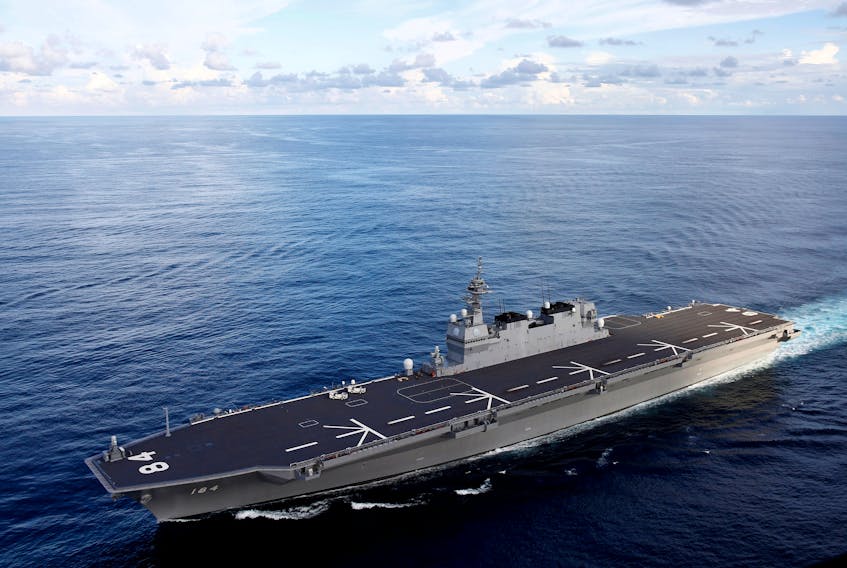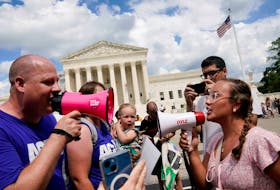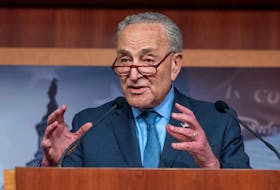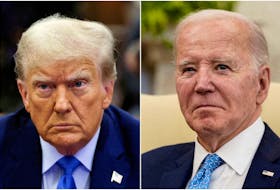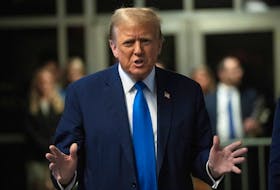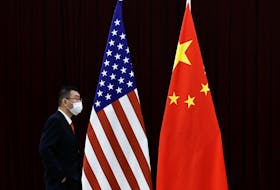By Linda Sieg
TOKYO (Reuters) - Prime Minister Shinzo Abe surged back to power seven years ago, pledging to bolster Japan's defenses in response to a growing threat from China and aiming to amend the pacifist constitution.
Now on track to become Japan's longest serving premier, Abe has kept his first promise. The second remains elusive.
That means Japan, which U.S. President Donald Trump has criticized over what he called an "unfair" security alliance, still faces limits on acting as a full-fledged American ally.
Trump has even suggested changing the two-way security pact that underpins the alliance, at a time when China is flexing its military muscle in the region and North Korea is pursuing nuclear and missile programs.
During Abe's watch, Japan has boosted defense spending by 10% after years of decline, expanding the military's ability to project power abroad. In a historic shift in 2014, his government reinterpreted the constitution to allow Japanese troops to fight overseas for the first time since World War Two.
But the conservative leader's inability to cement his legacy by revising the charter's pacifist Article 9 symbolizes persistent public wariness about putting troops in harm's way far from home and a fear of entanglement in U.S.-led wars.
"For the Japanese people, Article 9 is a kind of Bible," Hajime Funada, a ruling Liberal Democratic Party lawmaker and former head of a panel on revising the charter, told Reuters.
Japan's U.S.-drafted constitution is seen by conservatives as a humiliating symbol of defeat but by others as a brake on entanglement in foreign conflicts.
For both sides, a revision would be hugely symbolic.
According to a survey by NHK TV this week, voters gave the highest marks to Abe's security and diplomacy policies. But an Asahi newspaper survey earlier this year showed 64% opposed revising Article 9 while 28% favored amendment.
Any constitutional amendment requires approval by two-thirds of both houses of parliament and a majority in a national referendum.
Abe, who quit in 2007 after a troubled one-year term, returned to office in December 2012. On Nov. 20, he will exceed the record 2,886 days in office set by Taro Katsura in the early 20th century.
Abe's term as LDP leader ends in September 2021 and unless party rules are revised, that would spell the end of his tenure.
POWER PROJECTION, PUBLIC OPINION
A five-year defense program unveiled last year allocates 25.5 trillion yen ($233.7 billion) in spending, a 6.4% rise over the previous five years, and includes refitting two warships as Japan's first aircraft carriers since World War Two, a step toward a full-fledged blue-water navy.
A year after the cabinet reinterpreted the constitution, parliament enacted laws that ended a ban on exercising the right of collective self-defense, or defending a friendly country under attack, if Japan's survival is threatened.
Such steps have further pushed the limits of Article 9, which, if taken literally, bans the maintenance of a standing military but has been stretched by previous administrations to allow armed forces for self-defense.
"There is not much left of the post-war constraints," said Richard Samuels, director of the Center for International Studies at the Massachusetts Institute of Technology.
"It was under his (Abe's) administration where the fastest progress was achieved to get more distance from Article 9."
Nonetheless, Abe has been forced by public opinion and the LDP's less hawkish coalition partner, the Komeito party, to compromise.
"Theoretically, Abe has laid the groundwork for Japan to take one step closer to ... supporting the U.S. in combat for collective interests," said Ellis Krauss, professor emeritus at the University of California, San Diego.
"But I don't think Japan is near actually doing it."
PERSONAL MISSION
Last month, Japan proposed a mission by its navy in Middle East waterways, not as part of a U.S.-led coalition to protect merchant ships but separately under a Japanese law allowing research and intelligence gathering.
Even that sparked calls for caution from liberal media.
For Abe, revising the constitution is a personal mission - one that eluded his grandfather, Nobusuke Kishi, who quit as premier in 1960 due to a furor over a U.S.-Japan security pact.
"It's not only who he is, it's who his grandfather was and it's his base," Samuels said. "It's the view that says that ... we are a different Japan, no longer bound and constrained by the defeat of World War Two."
Abe has proposed writing the existence of Japan's Self-Defense Forces, as the military is known, into Article 9, far short of more drastic changes proposed previously by the LDP.
Critics in his own party say that would be a waste of political capital for little gain, although experts note an amendment could open the door to future bolder changes.
Abe appears unlikely to abandon the cause.
"Abe's fundamental philosophy is nationalism and without a change in Article 9, there can be no independence from the (U.S.) Occupation regime," said Yoshihide Soeya, a political science professor at Keio University. "I think he'll never give it up."
(Reporting by Linda Sieg; editing by Raju Gopalakrishnan)

